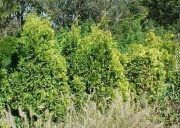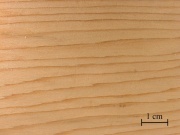Difference between revisions of "American arborvitae"
Jump to navigation
Jump to search
| Line 26: | Line 26: | ||
* G.S.Brady, ''Materials Handbook'', McGraw-Hill Book Co., New York, 1971 Comment: p. 808 | * G.S.Brady, ''Materials Handbook'', McGraw-Hill Book Co., New York, 1971 Comment: p. 808 | ||
| − | * | + | * Northern Hemlock and Hardwood Manufacturers Association, Oshkosh, Wis.: air-dry weight = 22 pcf |
* Wikipedia: http://en.wikipedia.org/wiki/Thuja_occidentalis (Accessed Mar. 15, 2006) -for non-English terms | * Wikipedia: http://en.wikipedia.org/wiki/Thuja_occidentalis (Accessed Mar. 15, 2006) -for non-English terms | ||
Latest revision as of 11:51, 26 April 2022
Description
A large white cedar, Thuja occidentalis, native to the northeastern United States and Canada. The American arborvitae, or northern white cedar, produces a pale brown, soft, aromatic timber that is resistant to fungi and moisture. The soft, lightweight wood is used for shingles, poles, tanks, cedar chests, and small boats. Thuja leaf oil is extracted from its leaves.
Synonyms and Related Terms
northern white cedar; eastern white cedar; New Brunswick cedar; eastern arborvitae ; Thuja occidentalis; Abendländische Lebensbaum (Deut.); tuia occidentale (It.); zywotnik zachodni (Pol.)
Physical and Chemical Properties
- Tree growing to 10-20 m with 0.5 diameter trunk
- Density = 22 pcf
Additional Images
Resources and Citations
- G.S.Brady, Materials Handbook, McGraw-Hill Book Co., New York, 1971 Comment: p. 808
- Northern Hemlock and Hardwood Manufacturers Association, Oshkosh, Wis.: air-dry weight = 22 pcf
- Wikipedia: http://en.wikipedia.org/wiki/Thuja_occidentalis (Accessed Mar. 15, 2006) -for non-English terms
- Dictionary of Building Preservation, Ward Bucher, ed., John Wiley & Sons, Inc., New York City, 1996
- Van Nostrand's Scientific Encyclopedia, Douglas M. Considine (ed.), Van Nostrand Reinhold, New York, 1976
- The American Heritage Dictionary or Encarta, via Microsoft Bookshelf 98, Microsoft Corp., 1998




